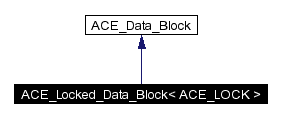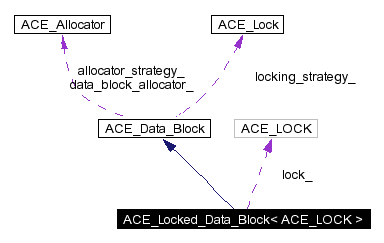
#include <Message_Block_T.h>
Inheritance diagram for ACE_Locked_Data_Block< ACE_LOCK >:


Public Methods | |
| ACE_Locked_Data_Block (void) | |
| Default "do-nothing" constructor. | |
| ACE_Locked_Data_Block (size_t size, ACE_Message_Block::ACE_Message_Type msg_type, const char *msg_data, ACE_Allocator *allocator_strategy, ACE_Message_Block::Message_Flags flags, ACE_Allocator *data_block_allocator) | |
| Initialize. | |
| virtual | ~ACE_Locked_Data_Block (void) |
| Delete all the resources held in the message. | |
| virtual ACE_Data_Block * | clone_nocopy (ACE_Message_Block::Message_Flags mask=0) const |
Private Methods | |
| ACE_Locked_Data_Block< ACE_LOCK > & | operator= (const ACE_Locked_Data_Block< ACE_LOCK > &) |
| ACE_Locked_Data_Block (const ACE_Locked_Data_Block< ACE_LOCK > &) | |
Private Attributes | |
| ACE_LOCK | lock_ |
| The lock. | |
Data_Blocks can be parametric on the kind of lock they use; in many cases the lifetime of the lock is tied to the lifetime of the Data_Block itself. But since Data_Blocks are reference counted it is hard for users to control the lock lifetime. This class is parametric over the kind of lock used.
|
||||||||||
|
Default "do-nothing" constructor.
|
|
||||||||||||||||||||||||||||||||
|
Initialize.
|
|
||||||||||
|
Delete all the resources held in the message.
|
|
||||||||||
|
|
|
||||||||||
|
Return an exact "deep copy" of the message, the dynamic type is ACE_Locked_Data_Block<> See the documentation in Message_Block.h for details. Reimplemented from ACE_Data_Block. |
|
||||||||||
|
|
|
|||||
|
The lock.
|
 1.2.18
1.2.18